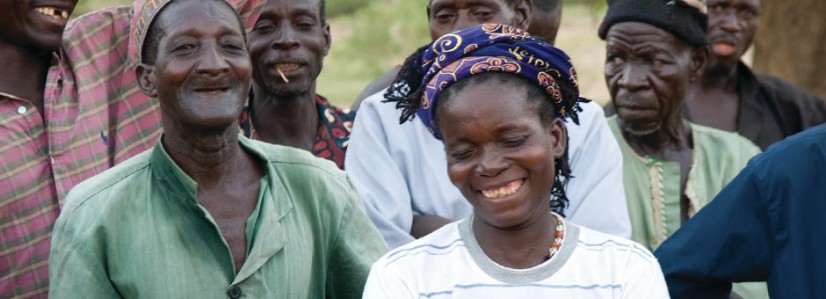Mother of five Sawatogo Aminato believes that beekeeping is her future.‘I have a small farm with my husband, but the climate here is difficult and it is hard for us to produce enough food,’ says the 40-year-old woman from Nioniopalga, one of ten villages where the Wend Yam Beekeeping Federation has been extending its work with support from Self Help Africa.
‘Beekeeping has allowed me to increase the amount I earn. It has been very good to many people in this community.’ A ‘traditional beekeeper’ in Oubritenga Province, in the hot dry Sahelian belt of Burkina Faso on the southern fringes of the Sahara Desert, Aminato says that since joining the Wend Yam Federation two years ago, she has been working hard to adopt new practices and develop the business potential of beekeeping.
As night falls she demonstrates how to harvest honey at the Central Apiary established by Wend Yam in nearby Lelexe village. It’s a facility where beekeepers are brought for training courses, and which is used by the Federation to raise awareness, promote best practice, and conduct training activities for members, in a region where an estimated 3,000 households are involved in beekeeping at a local level.
105 village beekeepers in the area are being supported by the Self Help Africa project, and Sawatogo Aminato is one of 50 women participating in the scheme. She received three improved quality top-bar hives from the project, and uses protective gloves, boots and smokers provided by the project to each of the ten villages where the Wend Yam initiative is being backed.
‘Our yields have increased and the quality of our honey is much better,’ says Aminato. ‘Although there is still potential for growth, I am now producing up to 20kg per harvest from my hives, and am harvesting three times a year.’ She has earned close to $120 from the enterprise in the past year – a sum that is more than one-quarter of the average annual earnings of a family in Burkina Faso.
‘The money that we earn from beekeeping allows us to buy additional food for our family during the difficult months. It also means that we can buy clothing, shoes and books, so that our children can go to school,’ she says.
As well as distributing equipment to beekeepers in each of the ten villages, under the Self Help Africa project the Wend Yam Federation has been promoting a wider commercialisation strategy for honey production, including the promotion of measures to ensure quality control, provision of technical training to Ministry of Agriculture field officers, and staging of training and awareness-raising visits through the National Beekeeping Organisation of Burkina Faso.
Each of the village groups has also participated in a range of training activities, and is receiving technical support and assistance with all aspects of beekeeping from Wend Yam. A number of villagers have begun trading in honey since they joined the Wend Yam Federation too – buying stock from rural households who use traditional methods, and selling it to Wend Yam.
Under this element of the project, 11 of the women members have received small loans from Wend Yam to establish secondary businesses, as buying agents for honey from other local producers in Oubritenga Province.
‘As agents they are encouraging other local beekeepers to use the best practices. If local beekeepers smoke their hives in the right way, harvest in the right way, keep their bees in the best conditions and store their honey properly, they will ultimately earn more from the sale of their produce,’ explains Self Help Africa’s Jean Claude Wedraogo.
The Self Help Africa project with Wend Yam Federation has received support from the UK Big Lottery Fund, DFID, the European Union, and other donors.

